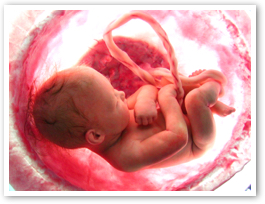Pro-Choice Myths Are Perpetuated by a "New York Times" Fetal-Personhood Story
- ALEXANDRA DESANCTIS
To undercut the pro-life perspective, the paper's editorial board relies on historical inaccuracies and philosophical elisions.
 Just days after Christmas, the New York Times editorial board released a lengthy feature on threats against abortion rights, asserting that the pro-life movement has invented the concept of "fetal personhood" in order to erode female autonomy.
Just days after Christmas, the New York Times editorial board released a lengthy feature on threats against abortion rights, asserting that the pro-life movement has invented the concept of "fetal personhood" in order to erode female autonomy.
The series delves into extremely rare applications of state legislation protecting the unborn — bills that criminalize drug abuse by pregnant mothers, for example — to illustrate the left-wing claim that American women are living in a "Handmaid's Tale" created by opponents of abortion.
But this attempted bombshell exposé is in fact a compilation of half-baked pro-choice myths, historical inaccuracies, and philosophical elisions mashed together to create a bludgeon against the pro-life movement, toward which the Times evidently harbors significant animosity.
An overwhelming majority of pro-life people agree with the Times, for instance, that laws penalizing women for having suffered a miscarriage or a stillbirth are unacceptable. And yet the entire series rests on a straw man: Abortion opponents rejoice when pregnant women are thrown in jail, because they care more about punishing the errant than about protecting human life.
Far from being a thoughtful reflection on the competing legal rights of mother and fetus, the Times series offers little more than blatant fearmongering, with the help of exceptionally uncommon horror stories that it uses to demonize the pro-life perspective. Here are the three most inaccurate claims from the feature:
1) The concept of fetal personhood is "a sharp break from the great traditions of Western law" and was invented by the anti-abortion movement to strip women of fundamental rights.
The Times feature asserts that "the creation of the legal scaffolding for the idea that the fetus is a person has been the steady work of the anti-abortion movement." The notion is, it says, a shift "away from a centuries-long tradition in Western law and toward the embrace of a relatively new concept: that a fetus in the womb has the same rights as a fully formed person."
In fact, both the English common-law tradition and U.S. state law historically recognized the value of unborn human life and frequently protected it. English common law long prohibited abortion at the earliest point that the fetus could be determined to be alive, referred to as "quickening" prior to advances in medical science. And a number of historical cases treated abortion as a crime, even before it was explicitly codified as such in the early 19th century.
Several American colonies adopted the English prohibition against abortion, and over the 19th and 20th centuries, most states strengthened those prohibitions to criminalize abortion at any stage of pregnancy, not just at quickening. There is no historical evidence that, in the common-law or the American constitutional tradition, abortion was ever considered a legal right prior to Roe v. Wade.
Compounding this glaring error, the Times airbrushes Roe and the subsequent Planned Parenthood v. Casey, both of which affirmed the state's interest in protecting fetal life. Though neither decision, of course, identified the unborn as persons, both gave state governments a jurisprudential foundation on which to craft laws based on fetal rights and balance them against the rights of mothers.
What's more, while personhood laws protecting the unborn are fairly limited, the abortion-rights movement denies personhood to unborn children so as to reduce their moral status, dehumanize them, and make the case for abortion. (The Times editorial board is only too glad to assist in this effort, referring to them as "clusters of cells" and "fertilized eggs" and putting the phrases "unborn life" and "unborn children" in scare quotes.)
The majority opinion in Roe noted that if the unborn could be considered "persons" under the Constitution, then the case for legal abortion would fall apart. Well aware of this threat, pro-choice advocates ground their activism and argumentation in routine and vociferous refutations of the personhood of the unborn. This tendency should concern alert observers. Throughout human history, denials of personhood have always been used by the most powerful to oppress the weak, by people with the upper hand to subjugate human beings who can't protect themselves. The most prominent example of such an unjust use of "personhood" in American history need not even be named.
2) Americans weren't actually pro-life until the last few decades, and the anti-abortion movement, as represented by the GOP, rests on political ambition rather than principle.
"Out of concern for individual freedom, the Republican Party once treated abortion as a private matter," the Times feature asserts, suggesting that only extremists would favor limiting abortion. The slim substantiation provided for this point is the fact that, as governor of California, Ronald Reagan signed a law permitting abortion — a decision he later came to intensely regret — and a 1972 poll showing that 68 percent of Republicans believed the question of abortion should be handled between women and their doctors.
Neither of these is particularly compelling evidence. What's more, the Times editorial board insinuates that it was only after GOP strategists determined that abortion was an "explosively emotional issue that could motivate evangelical voters and divide Democrats" that the party rallied around an anti-abortion platform in the early 1980s.
This argument disregards the obvious effect of the Roe v. Wade decision on the politics of abortion. Before seven justices manufactured the right to abortion out of whole cloth and forced their incoherent rationale on the entire country, each state had the power to establish its own laws on the issue. In such a landscape, the nation as a whole might eventually have reconciled Americans' sharply polarized views on abortion, women's autonomy, and fetal life, or at least found a workable balance, with some variation from state to state as the voters made their preferences clear.
Instead, the Court aborted the debate and thereby created the need for a political party that would represent the views of pro-life Americans. To the extent that the pro-life movement and the GOP embrace personhood bills, it is precisely because Roe itself insisted that fetuses lack personhood and therefore lack rights.
3) Fetal rights and the rights of mothers are a zero-sum game.
"A society that embraces a legal concept of fetal personhood would necessarily compromise existing ideals of individual freedom," the Times series states. The feature's subtitle reads: "States are extending liberties to the unborn — by taking them from women." The introduction, meanwhile, notes that "more and more laws are treating a fetus as a person, and a woman as less of one, as states charge pregnant women with crimes."
These statements are true in one sense: Every law governing individual behavior is, to some extent, a restriction of rights. But the Times uses that fact to paper over the question that complicates the abortion debate: How should a just society balance the fetal right to life with the mother's rights to bodily autonomy and authority over the child inside her?
Instead of acknowledging this dilemma, the Times assumes that any effort to protect fetal life unjustly erases the mother's entire personhood and autonomy, as if there were no cases in which it is proper to limit the rights of some individuals to protect the rights of others. That is, of course, the fundamental contention of the pro-life movement: Every fetus is a distinct human being with a right to life, a right that supersedes the mother's right to terminate the life inside her. To ignore this fundamental point and instead accuse the anti-abortion movement of weaponizing personhood is to miss the heart of the abortion debate.
But such a clumsy elision is necessary to facilitate the absurd assertions of the Times editorial board, such as: "If a fetus is granted equal rights, women who become pregnant may find their most personal decisions coming under state control" and "A pregnant woman would cease to exist as an autonomous person." This is abortion advocacy, not a serious legal argument.
The question of personhood is an essential ethical consideration in the abortion debate. But this Times feature contributes little to the conversation and in fact hinders it, relying instead on straw men and extreme cases to undercut the positive case for the rights of the unborn.
 This is Meaghen Gonzalez, Editor of CERC. I hope you appreciated this piece. We curate these articles especially for believers like you.
This is Meaghen Gonzalez, Editor of CERC. I hope you appreciated this piece. We curate these articles especially for believers like you.
Please show your appreciation by making a $3 donation. CERC is entirely reader supported.

Acknowledgement
 Alexandra DeSanctis. "Pro-Choice Myths Are Perpetuated by a New York Times Fetal-Personhood Story." National Review Online (January 3, 2019).
Alexandra DeSanctis. "Pro-Choice Myths Are Perpetuated by a New York Times Fetal-Personhood Story." National Review Online (January 3, 2019).
Reprinted with permission from National Review Online.
The Author
 Alexandra DeSanctis is a William F. Buckley Fellow in Political Journalism and a graduate of the University of Notre Dame, where she studied political science, theology, and the Constitution. She has interned for the Laura Ingraham Radio Show, USA TODAY, and the High Point Enterprise newspaper in North Carolina. Alexandra has written for the College Fix, the National Catholic Register, the Cardinal Newman Society, and the online journal of religion and politics Ethika Politika.
Alexandra DeSanctis is a William F. Buckley Fellow in Political Journalism and a graduate of the University of Notre Dame, where she studied political science, theology, and the Constitution. She has interned for the Laura Ingraham Radio Show, USA TODAY, and the High Point Enterprise newspaper in North Carolina. Alexandra has written for the College Fix, the National Catholic Register, the Cardinal Newman Society, and the online journal of religion and politics Ethika Politika.




